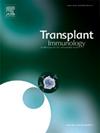Trametinib alleviates lipopolysaccharide-induced acute kidney injury by inhibiting macrophage polarization through the PI3K/Akt pathway
IF 1.4
4区 医学
Q4 IMMUNOLOGY
引用次数: 0
Abstract
Background
Sepsis-induced acute kidney injury (AKI) is a severe condition characterized by dysregulation of pro- and anti-inflammatory responses. Targeting macrophage polarization between pro-inflammatory M1 and anti-inflammatory M2 cells offers a potential therapeutic approach for AKI. Trametinib (TRAM), an inhibitor of the MEK1/2 signaling pathway, was evaluated for its impact on M1/M2 polarization in AKI.
Methods
Wild-type (WT) mice were subjected to lipopolysaccharide (LPS)-induced AKI and intraperitoneally treated with dimethyl sulfoxide (DMSO) or TRAM (10 mg/kg) for three days. Renal function was assessed by measuring creatinine levels. While histopathological changes, RNA sequencing data, and serum cytokine levels were analyzed. Macrophage M1/M2 polarization in kidney tissues was examined using flow cytometry and immunohistochemistry. Murine bone marrow-derived macrophages (BMDMs) were polarized to the M1 or M2 phenotype in vivo and treated with or without TRAM (10 μM). M1/M2 polarization was analyzed via flow cytometry, and PI3K/Akt signaling was evaluated by western blotting.
Results
TRAM significantly improved renal function, as demonstrated by reduced serum creatinine levels (p < 0.01) and ameliorated histopathological damage (p < 0.01). Flow cytometry and immunohistochemistry revealed that TRAM markedly inhibited pro-inflammatory M1 macrophage polarization (p < 0.001). Additionally, TRAM reduced serum level of IFN-γ (p < 0.01) and IL-17 (p < 0.001). In vitro, TRAM suppressed M1 polarization (p < 0.05) by inhibiting the PI3K/Akt signaling pathway.
Conclusion
TRAM mitigated LPS-induced AKI by suppressing M1 macrophage polarization via the PI3K/Akt pathway, highlighting its therapeutic potential for AKI and other inflammatory kidney diseases.
曲美替尼通过PI3K/Akt通路抑制巨噬细胞极化,减轻脂多糖诱导的急性肾损伤。
背景:脓毒症引起的急性肾损伤(AKI)是一种以促炎和抗炎反应失调为特征的严重疾病。靶向促炎M1和抗炎M2细胞之间的巨噬细胞极化为AKI提供了潜在的治疗方法。Trametinib (TRAM)是一种MEK1/2信号通路抑制剂,被评估其对AKI中M1/M2极化的影响。方法:野生型(WT)小鼠采用脂多糖(LPS)诱导的AKI,并腹腔注射二甲亚砜(DMSO)或TRAM(10 mg/kg) 3 d。通过测定肌酐水平来评估肾功能。同时分析组织病理学变化、RNA测序数据和血清细胞因子水平。采用流式细胞术和免疫组织化学检测肾组织巨噬细胞M1/M2极化。小鼠骨髓源性巨噬细胞(bmmdms)在体内被极化为M1或M2表型,并接受或不接受TRAM(10 μM)处理。流式细胞术检测M1/M2极化,western blotting检测PI3K/Akt信号通路。结果:TRAM显著改善肾功能,降低血清肌酐水平(p )结论:TRAM通过PI3K/Akt通路抑制M1巨噬细胞极化减轻lps诱导的AKI,突出了其治疗AKI和其他炎症性肾脏疾病的潜力。
本文章由计算机程序翻译,如有差异,请以英文原文为准。
求助全文
约1分钟内获得全文
求助全文
来源期刊

Transplant immunology
医学-免疫学
CiteScore
2.10
自引率
13.30%
发文量
198
审稿时长
48 days
期刊介绍:
Transplant Immunology will publish up-to-date information on all aspects of the broad field it encompasses. The journal will be directed at (basic) scientists, tissue typers, transplant physicians and surgeons, and research and data on all immunological aspects of organ-, tissue- and (haematopoietic) stem cell transplantation are of potential interest to the readers of Transplant Immunology. Original papers, Review articles and Hypotheses will be considered for publication and submitted manuscripts will be rapidly peer-reviewed and published. They will be judged on the basis of scientific merit, originality, timeliness and quality.
 求助内容:
求助内容: 应助结果提醒方式:
应助结果提醒方式:


